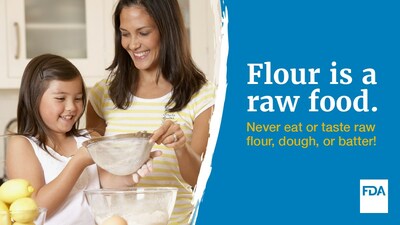SILVER SPRING, Md., Dec. 5, 2023 /PRNewswire-HISPANIC PR WIRE/ — This year’s holiday season is right around the corner, and the U.S. Food and Drug Administration (FDA) has information to help you handle flour safely while cooking and baking. Keep your loved ones safe by learning more about flour and best practices for safe flour handling while making holiday treats like cakes, cookies, and pies.

About Flour
Did you know that flour is a raw food and eating uncooked or under-cooked flour can make you sick? Flour is made from raw grains, and processing raw grains into flour does not kill harmful bacteria. This means that eating raw flour could expose you to harmful bacteria like Salmonella and Escherichia coli (E. coli). Flour is a common ingredient used in baking and cooking, so it’s important to avoid snacking on raw flour, dough, or batter to prevent you and your family from getting a foodborne illness, also known as “food poisoning.”
Some of your family’s favorite holiday treats may contain flour. Make sure to follow the FDA’s list of Do’s and Don’ts to help you and your family safely enjoy these treats this holiday season.
Do’s
- DO make sure to follow directions on baking mixes or flour-containing products to ensure correct baking times and temperatures.
- DO keep flour away from ready-to-eat foods. Remember that flour is a powder that can spread easily.
- DO refrigerate raw cookie or pastry dough according to package directions. Make sure your refrigerator is at least at a safe 40°F.
- DO clean up carefully after working with raw flour. Wash hands thoroughly with soap and running water and wash utensils, bowls, baking pans, cutting boards, and countertops with warm, soapy water.
Don’ts
- DO NOT eat, taste, or allow children to eat or play with raw dough or baking mix before cooking.
- DO NOT let children use raw dough for crafts or play clay.
- DO NOT use raw flour products like cake mixes and cookie dough to make ready-to-eat products like milkshakes or ice cream.
- DO NOT try to heat-treat raw flour yourself. Home treatments of flour may not effectively kill all bacteria, making it unsafe to eat.
- DO NOT keep recalled flour in your pantry. It’s best to throw it away.
Make sure to review FDA’s full list of Do’s and Don’ts for handling flour safely.
For more information on safe food handling, visit: https://www.fda.gov/food/buy-store-serve-safe-food/safe-food-handling. This resource provides four simple steps that can help keep you and your family safe from food-related illnesses.
Contact: Media: 1-301-796-4540 Consumers: 1-888-SAFEFOOD (toll-free)

Foto – https://mma.prnewswire.com/media/2266040/FDA_Flour_PSA.jpg
Logo – https://mma.prnewswire.com/media/585467/US_FDA_Logo.jpg
SOURCE U.S. Food and Drug Administration







